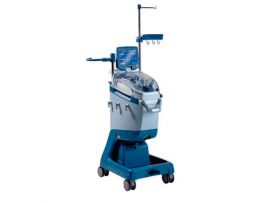Abstract Background: Cardiac surgery is associated with peri-operative bleeding, which may result in the need for blood transfusion, particularly in paediatric congenital cardiac surgery on cardiopulmonary bypass (CPB). There is..
Read MoreAbstract The aim of the study was to evaluate the disposition of plasma unbound cefazolin in patients undergoing cardiothoracic surgery with cardiopulmonary bypass (CPB). Adult patients undergoing cardiothoracic surgery with..
Read MoreAbstract In this issue of the ASAIO Journal, Keane et al. present the results of their exploratory study on the combined use of whole body bioimpedance (WBB) and relative blood volume (RBV) monitoring..
Read MoreAbstract Background Fish oil is among the most common natural supplements for treatment of hypertriglyceridemia or prevention of cardiovascular disease. However, concerns about theoretical bleeding risk have led to recommendations..
Read MoreAbstract Background There is growing evidence regarding the importance of contextual factors for patient/staff outcomes and the likelihood of successfully implementing safety improvement interventions such as checklists; however, certain literature..
Read MoreAccording to the US Department of Health and Human Services, “Research misconduct means fabrication, falsification, or plagiarism in proposing, performing, or reviewing research, or in reporting research results.” Other important irregularities..
Read MoreAbstract Background Adult cardiac surgery with extracorporeal circulation is known to be associated with increased risk of blood transfusion leading to adverse outcomes. Procedures like retrograde autologous priming (RAP) may..
Read MoreAbstract According to a survey by the University of Ottawa in 2009, we have surpassed the 50 million mark over the total number of scientific articles published since 1665, and..
Read MoreSelective visceral perfusion improves renal flow and hepatic function in neonatal aortic arch repair
Abstract OBJECTIVES The aortic arch repair in the neonatal period is a complex procedure with significant morbidity. We define a useful double-perfusion technique and its effect on the function of..
Read MoreAbstract A best evidence topic in cardiac surgery was written according to a structured protocol. The question addressed was ‘In patients undergoing off-pump coronary artery bypass grafting, for single or..
Read MoreAbstract Objective Prolonged intensive care unit (ICU) stay prevents the use of ICU equipment by other patients and increases hospital cost. This retrospective study aimed to investigate the risk factors..
Read MoreAbstract This article seeks to understand whether a volume–outcome relationship exists in adult extracorporeal membrane oxygenation (ECMO). We examined primary administrative discharge data from the Pennsylvanian Health Care Cost Containment..
Read MoreAbstract Low plasma fibrinogen level is common after cardiopulmonary bypass (CPB). Current substitution practice with fibrinogen concentrate generally follows a single measurement and cut-off values from the literature, whereas early..
Read MoreAbstract Background Donation after circulatory death (DCD) can increase the pool of available organs for transplantation. This pilot study evaluates the implementation of a controlled DCD (cDCD) protocol using normothermic..
Read MoreAbstract Objective: Hemodilution is a concern in cardiopulmonary bypass (CPB). Using a smaller dual tubing rather than a single larger inner diameter (ID) tubing in the venous limb to decrease..
Read MoreAbstract When designing a clinical study, a fundamental aspect is the sample size. In this article, we describe the rationale for sample size calculations, when it should be calculated and..
Read MoreAbstract The use of cell salvage is recommended when it can be expected to reduce the likelihood of allogeneic (donor) red cell transfusion and/or severe postoperative anaemia. We support and..
Read MoreAbstract Background Extracorporeal membrane oxygenation (ECMO) is increasingly used in resuscitation of critically ill patients with documented improved survival. Few studies describe ECMO use in cardiogenic shock. This study examines..
Read MoreAbstract Background Protamine neutralization is an essential step for the safe use and inactivation of the unfractionated heparin (UFH) that is widely employed in surgical and non‐surgical procedures involving extracorporeal..
Read MoreAbstract Background Since the 2009 pandemic influenza, we have nationally established a committee of the extracorporeal membrane oxygenation (ECMO) project. This project involves adequate respiratory management for severe respiratory failure..
Read MoreAbstract Introduction: Postoperative delirium is the most common neurological complication of cardiac surgery. Hypoxia has been shown to increase the risk of postoperative delirium. The possibility to continuously monitor oxygen..
Read MoreAbstract When designing a clinical study, a fundamental aspect is the sample size. In this article, we describe the rationale for sample size calculations, when it should be calculated and..
Read MoreAbstract For 3 decades, the American College of Cardiology (ACC) and the American Heart Association (AHA) have jointly developed clinical practice guidelines in an effort to align patient care with..
Read MoreAbstract Introduction: Hypothermic circulatory arrest is widely used for correction of acute type A aortic dissection pathology. We present our experience of 45 consecutive patients operated in our unit with..
Read MoreAbstract Objectives: Minimal extracorporeal circulation techniques and systems (MiECC) may reduce the negative side effects of conventional extracorporeal circulation (ECC). However, it is still unclear as to what this is caused..
Read MoreAbstract Minimal invasive extracorporeal circulation (MiECC) has initiated important new efforts within science and technology towards a more physiologic perfusion. In this study, we aim to investigate the learning curve..
Read MoreAbstract What We Already Know about This Topic Cardiac surgery is associated with cognitive decline and postoperative delirium The relationship between postoperative delirium and cognitive decline after cardiac surgery is..
Read MoreAbstract Background Acute kidney injury (AKI) after cardiovascular surgery is a serious complication. Little is known about the ability of novel biomarkers in combination with clinical risk scores for prediction..
Read MoreAbstract OctaplasLG is indicated for use in patients undergoing cardiac surgery who require replacement of multiple clotting factors. The use of OctaplasLG over single-donor fresh frozen plasma (FFP) may have..
Read MoreAbstract Veno-venous (VV) extracorporeal membrane oxygenation (ECMO) is the most efficient technique for respiratory support. It is based on a patient adequate circulation and cardiac function and it is indicated..
Read More


























